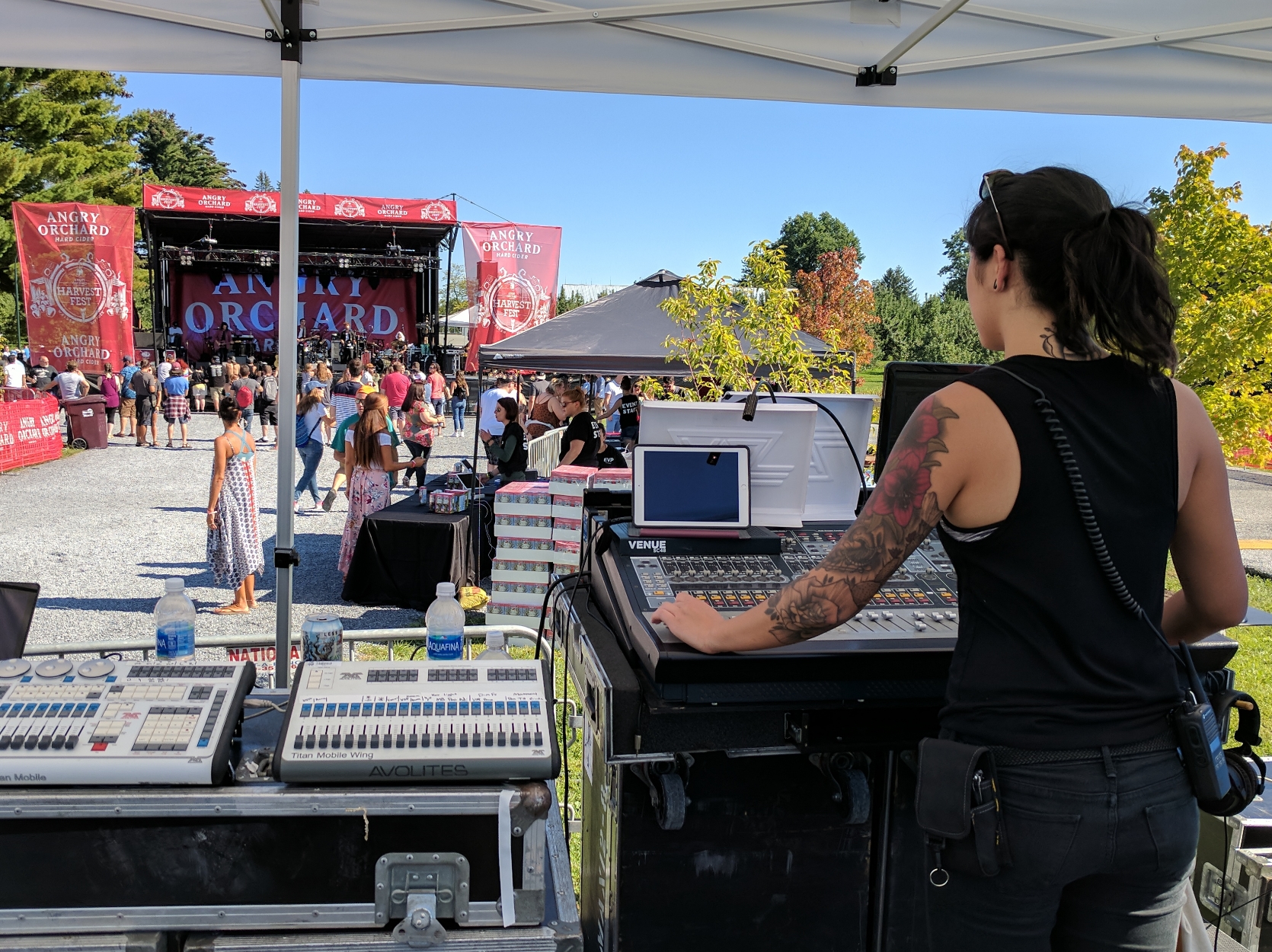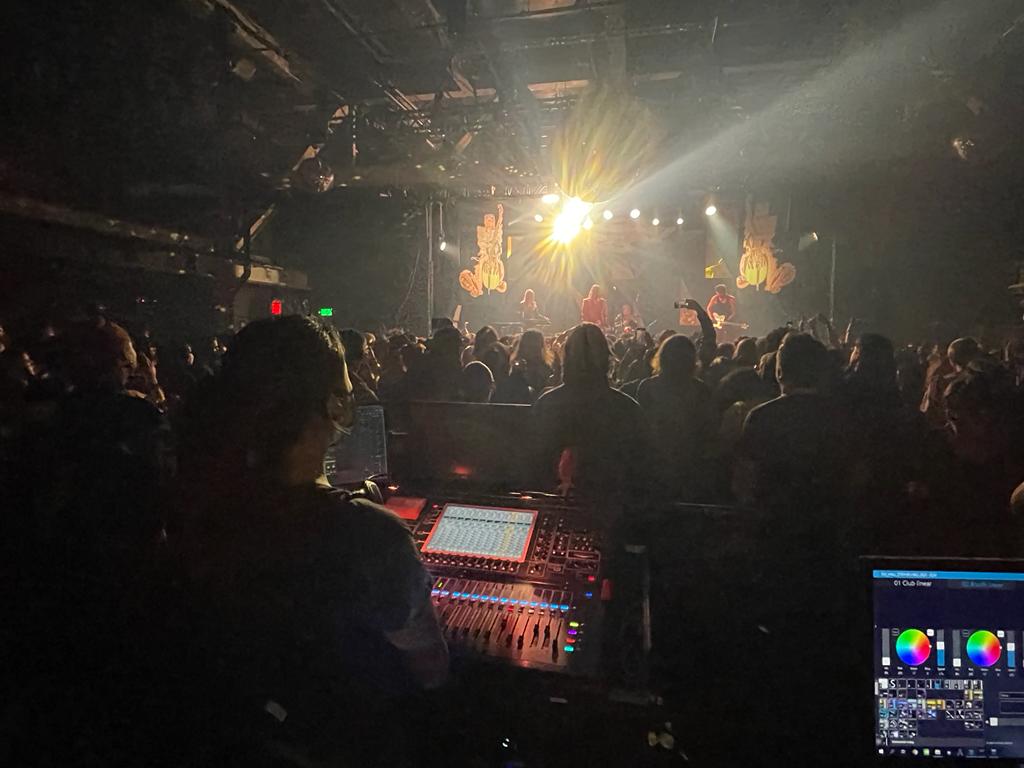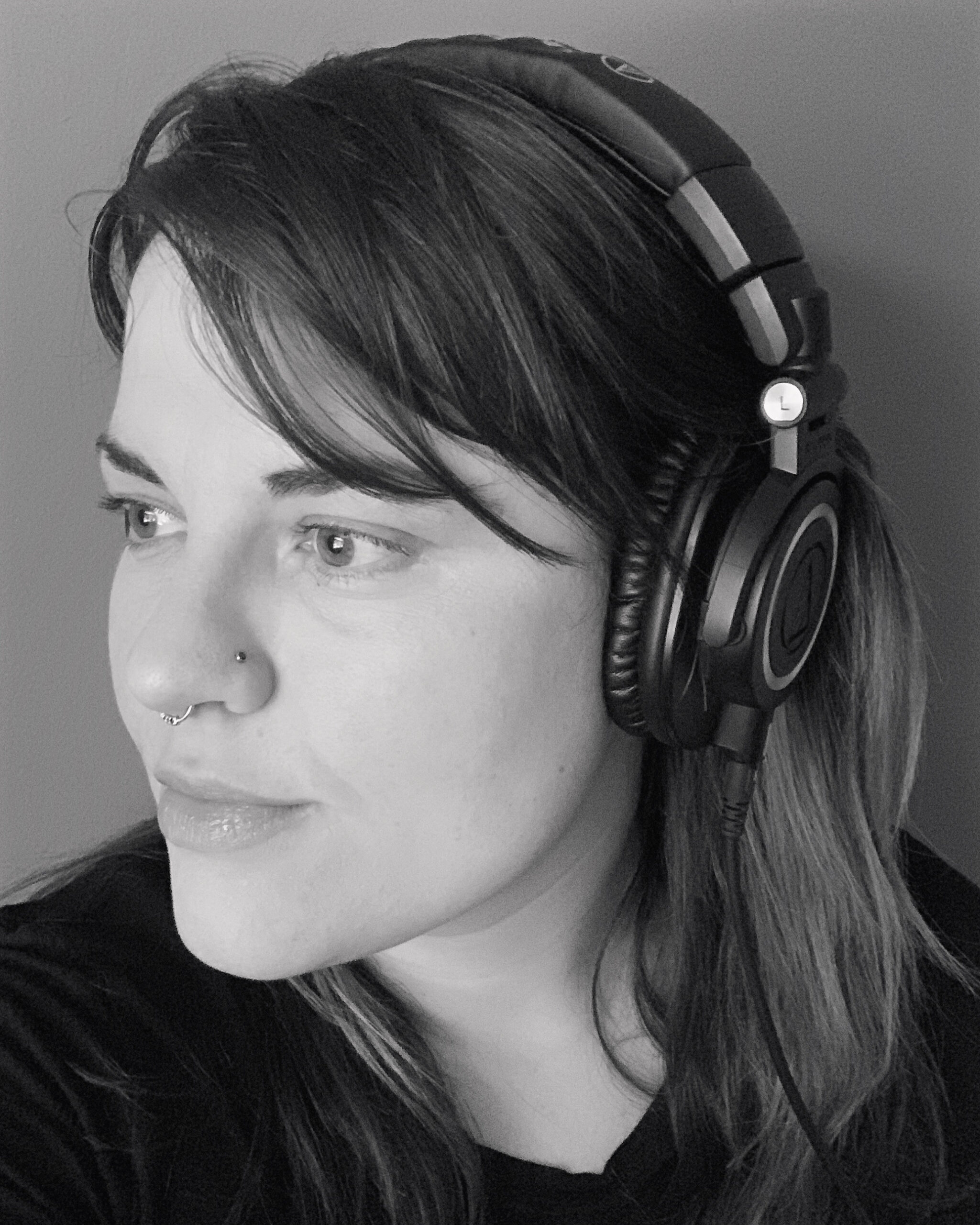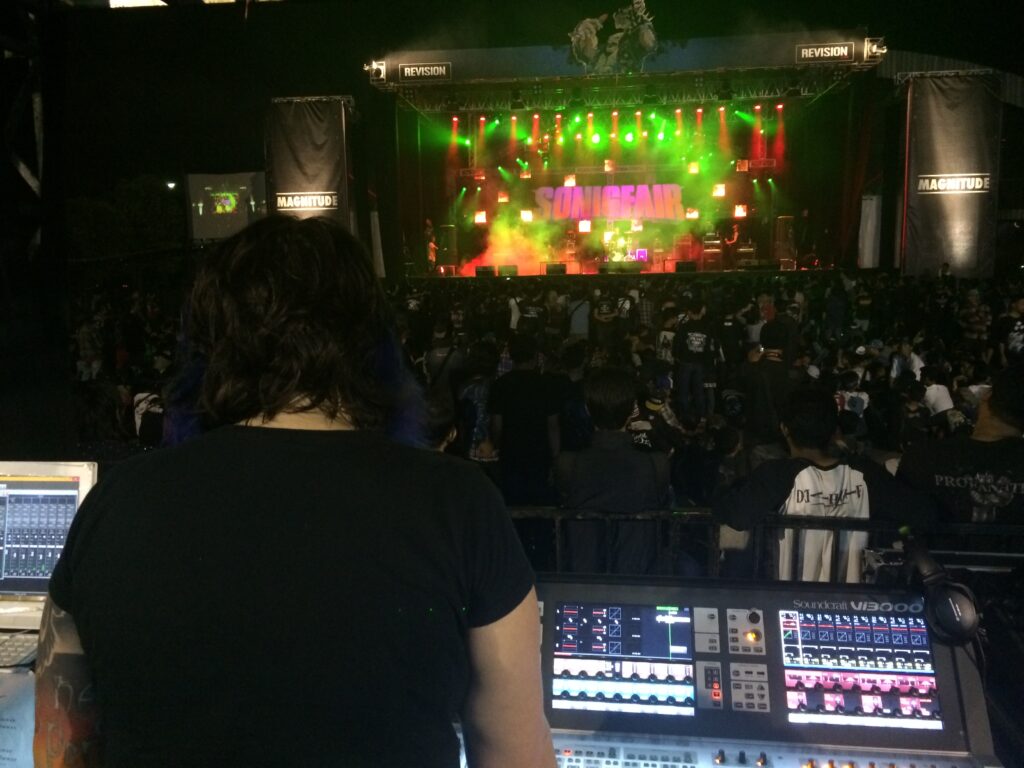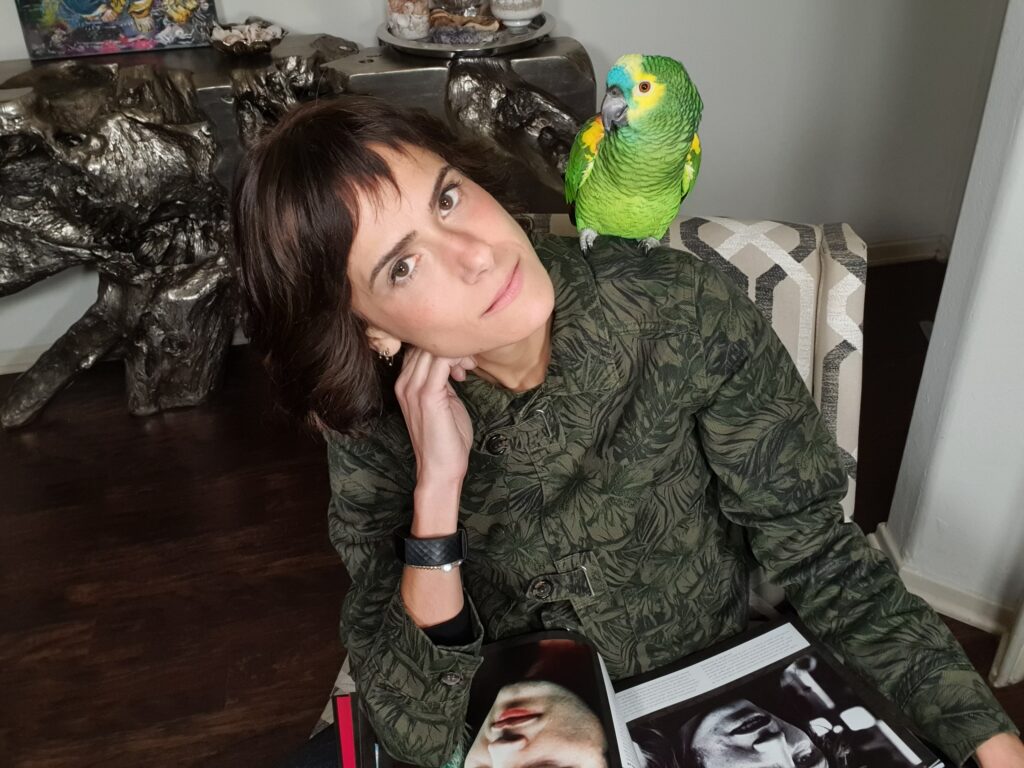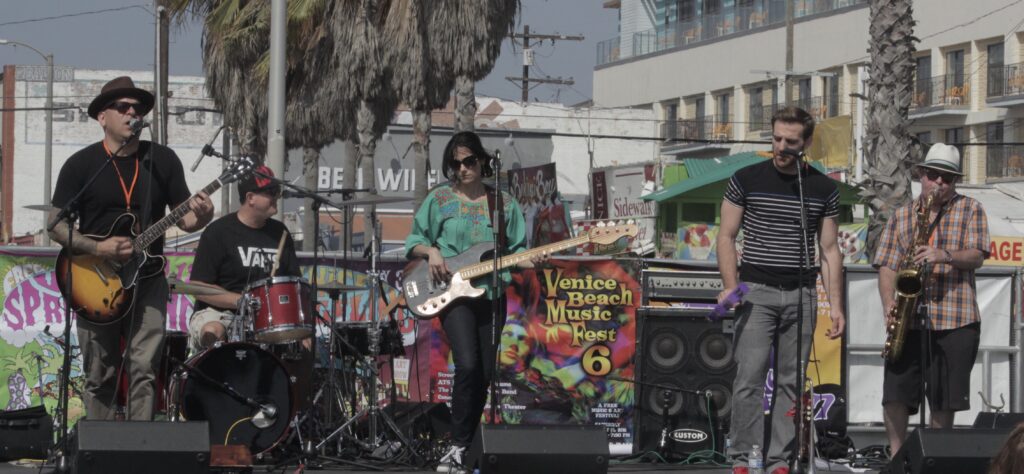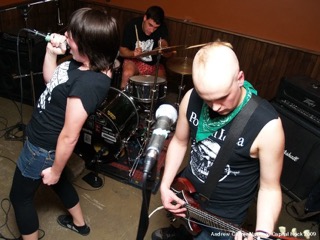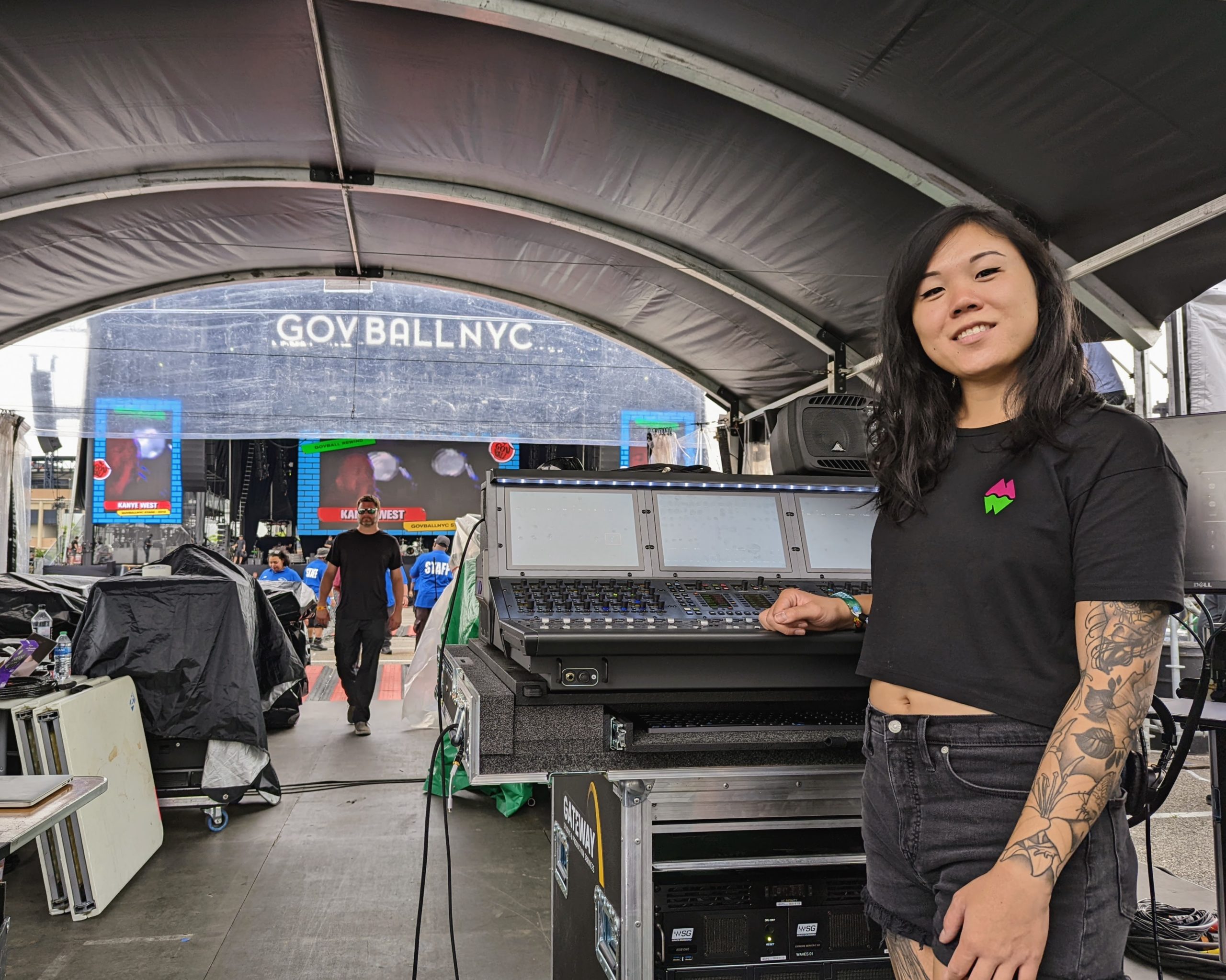
Taiya Cheng – Transforming Sound
Taiya Cheng is a freelance Front of House (FOH) and Monitor Engineer. She grew up in Bangor, Maine, and was passionate about playing guitar with her high school bands and attending punk, hardcore, and metal shows. She remarked that these shows often sounded bad, and wondered how she could help change this. When it came time to attend college, Taiya took a general semester before making the decision to pursue a bachelor’s degree in communications at the New England School of Communications in Bangor, Maine.
During her junior year, a partnership between her school and a local television station allowed her to begin working as an audio engineer. After graduating, she was eager to further develop her skills and accepted a summer internship with PRG in Las Vegas. For Taiya, that summer was the push she needed to start her full-time career in audio: “Through this guided internship, I was learning workflow and applying what I learned in college to the real world. It all really clicked, even if I had to learn some things the hard way like ringing out monitors and frequencies.” She stayed in Vegas for three more years, primarily working as a monitor engineer at the Sunset Station Casino.
In 2017, Taiya moved back to the east coast to be closer to her family. She now lives in New York City and works for various production companies and music venues. She particularly likes working at her home venue, Elsewhere. At the end of 2019, she delved into touring. She has since toured as FOH with Madison Cunningham, Son Lux, and Overcoats, as well as monitor engineer with Sleigh Bells.
Earlier this year, Taiya opened up about her trans identity. As she transitioned as a
teenager, many of her colleagues were unaware. For Taiya, it was important to speak out on her journey in a time where so many LGBTQ+ rights are being attacked and to be open and visible in an industry that has traditionally been a cis-male-dominated space.
Maxime: What is your typical day like on tour and what’s your typical day like at a venue like Elsewhere? Are they different?
Taiya: Yeah, they’re different. When you’re on tour in a van, you wake up somewhere in the country, probably in a hotel room. You get ready for lobby call, get to the venue, and then it’s just like a typical day of loading in, setting things up, making share the PA sounds good… maybe trying to find a coffee shop nearby with good coffee. Then it’s just normal sound check stuff. I’ve found that with touring, everything is always on the go. You’re always thinking about what’s going to happen next, whether it be like the run of a show or finding coffee or finding a place to eat lunch, or maybe seeing if you have any downtime to see friends in town. Being on tour is always being on the hunt for something. You add to that coordinating with venue staff, which can be challenging, but also fun. It’s also great to be going into cool venues and seeing what the live sound community is like there. And then it’s the show, and you load out and pack the van.
Maxime: That’s a great point about cool venues because that’s how I met both you and Katie Lau – another talented sound engineer who works at Elsewhere. I think it’s always nice to go to someone else’s home venue and see how they run things.
Taiya: Yeah, that’s what I really like about working at Elsewhere, there’s a great community, it’s a queer-friendly space, and we have great acts come through all the time. And I love the familiarity of my home venue, knowing the gear, and my co-workers. To go back to your question about touring and venue work, there are some similarities. As a venue tech, you don’t always know who’s going to come through and how it’s going to be working with the band/artists’ touring crew. Then on the other side of the same coin, as a touring tech, you don’t know who the venue staff is and what their experience level might be.
Maxime: What do you enjoy most about this job?
Taiya: It would have to be the music. When you’re working with an artist you choose to tour with,
hopefully, you really like their music! When I mix FOH and tour, it scratches a more creative part of my brain when it comes to reverbs and delays, deciding which compressors or saturators to use to achieve a certain sonic characteristic. I love thinking of all the different techniques there are to achieve a balanced mix and to get it to sit well within itself. I also have a technical mind. When I work with production companies, it’s very utilitarian. It’s like a puzzle having to just make things work. Something that I love about working jobs with production companies is helping to facilitate the event even if I’m not the one behind the console. That could be from putting microphones on people to coordinating RF to being the comm tech or setting up the PA. So that scratches the technical side of my brain. I also love the travelling and adventure aspect.
Maxime: What’s your favorite day off activity, either on tour or at home?
Taiya: I’ve been trying to play guitar more often, noodling around. I love biking, I’m an avid bike rider. Hanging with friends. Summer’s coming around, so you know hopefully going to the beach a lot, I’m kind of a beach bum.
Maxime: What are your long-term goals?
Taiya: I think it’d be cool to learn more about systems tech’ing and work towards being a systems engineer. I’d also like to teach. When I’m on a show site or at a venue and end up working with a greener tech, I love trying to get them to a place where they better understand what they’re doing. I think that’s really fulfilling for me because I’m helping them move forward in their career and in a way it’s also a form of problem-solving: trying to figure out how you can convey this concept to this person in a way where they can understand it and when you need to explain things it forces you to do your diligence and make sure you know what you’re talking about!
Maxime: Have you faced any obstacles or barriers in your career?
Taiya: Thinking I had to say yes to everything. It’s an easy thing to do in this in this industry, and then you just overburden yourself. You need to figure out your boundaries and be comfortable with saying no to things. Sometimes I think a lot of us freelancers think we have to say yes to everything because we don’t know when the next gig is coming through, or we have FOMO, but we also need to prioritize a work-life balance.
Working with grumpy sound guys is also challenging, or just being a woman in the industry as well. Having men “explain” things to me when I didn’t ask for that condescension and things like that.
Maxime: How do you deal with those obstacles?
Taiya: Well, for work-life balance, I’ve become very comfortable saying no because I know work things are always going to pop up. If it doesn’t immediately make me say fuck yes, I usually don’t do it. It’s important to have a life outside work because it’s easy for work to take over. Especially because audio work is kind of a lifestyle, right? So, it’s easy to fall into that overworking trap sometimes.
When I’m dealing with grumpy sound guys, I just stay confident. I try not to cave in, I stay confident, and that usually helps. Whether that teaches that guy anything is another story, but as far as trying to get through my day, I try not to let that person bother me because of who they are.
Maxime: Do you have any advice for young people who wish to enter the field?
Taiya: Be confident in what you know, but also don’t be afraid to ask for help. Know that it’s okay to ask for clarification. Always stay curious, and watch a lot of educational videos – YouTube is a great resource for audio knowledge. Learn to hang out, absorb information from other techs around you but also to be social. If you’re going to be working with someone for fourteen-plus hours a day, you want to be able to be social. being social.
Maxime: What are some must-have skills to become an audio engineer?
Taiya: Knowing how to troubleshoot is a big one, and knowing how to stay calm under pressure is very important. Being proactive. Asking the right questions for clarification on things. Thinking ahead, and signal flow. Good old signal flow.
Maxime: Do you have any favourite pieces of gear?
Taiya: I really like Digico consoles. For hardware, the SSL Bus Compressor, the SSL Fusion, and the Neve Dual Diode Bridge Compressor. I also love Beyer Dynamic microphones.
